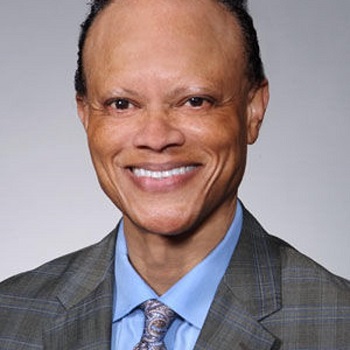
Hannibal B. Johnson
- Harvard Law Graduate and DE&I Speaker
- Best-Selling Author of African American Culture and History
Hannibal B. Johnson is a graduate of Harvard Law School. He did his undergraduate work at The University of Arkansas, where he completed a double major in economics and sociology. Johnson is an attorney, author, andindependent consultant specializing in diversity & inclusion/cultural competence issues and nonprofit governance.Johnson has also served as an adjunct professor at...
read the restHannibal B. Johnson is a graduate of Harvard Law School. He did his undergraduate work at The University of Arkansas, where he completed a double major in economics and sociology. Johnson is an attorney, author, andindependent consultant specializing in diversity & inclusion/cultural competence issues and nonprofit governance.Johnson has also served as an adjunct professor at The University of Tulsa College of Law (legal writing; legal ethics), Oklahoma State University (leadership and group dynamics; business law [MBA Program]), and the University ofOklahoma (ethics; cultural diversity; race & reason; The 1921 Tulsa Race Riot; nonprofit leadership & management).
Johnson is past president of Leadership Tulsa, past president of the Metropolitan Tulsa Urban League and pastpresident of the Northeast Oklahoma Black Lawyers Association. He served as Chairman of the board of directorsof The Community Leadership Association, an international leadership organization, during 2001 – 2002, and is afounding director of the Oklahoma Appleseed Center for Law and Justice. He currently serves on the Oklahoma Advisory Committee for the United States Commission on Civil Rights, and as Chairman of the board of directors ofthe Oklahoma Department of Libraries. Johnson directed Anytown, Oklahoma, a statewide human relations camp forteens, for more than a decade. He serves on the board of Planned Parenthood of Arkansas and Eastern Oklahoma, andon the Advisory Board of the Mayborn Literary Nonfiction Writers Conference of the Southwest. Johnson, a memberof The Rotary Club of Tulsa, serves on the Institutional Review Board for Oklahoma State University Center for Health Sciences, on the Tulsa Public Schools Fine Arts Advisory Board and on the board of directors of the Foundation for Tulsa Schools. He is a member of the Programs Committee for the John Hope Franklin Center for Reconciliation. In 2004, Mr. Johnson graduated with the inaugural class of the national “Connecting Community Fellowship Program”based in Richmond, Virginia. Johnson is certified by the City of Tulsa BRIDGE program (Building Resources InDeveloping and Growing Enterprises).
Johnson’s books include: Black Wall Street–From Riot to Renaissance in Tulsa’s Historic Greenwood District; Up From theAshes—A Story About Community; Acres of Aspiration—The All-Black Towns in Oklahoma; Mama Used To Say—Wit &Wisdom From The Heart & Soul; No Place Like Home—A Story About an All-Black, All-American Town; IncogNegro—Poetic Reflections on Race & Diversity in America; and Apartheid in Indian Country?: Seeing Red Over Black Disenfranchisement.Johnson’s play, Big Mama Speaks—A Tulsa Race Riot Survivor’s Story, has been performed at the Tulsa PerformingArts Center, Philbrook Museum of Art, and was selected for the 2011 National Black Theatre Festival in Winston-Salem,North Carolina. Johnson is a contributing writer to the ENCYCLOPEDIA OF AFRICAN AMERICAN HISTORY (NewYork, New York: Facts on File, Inc. 2010), penning two articles: Langston, Oklahoma and the Birth of the All-Black TownMovement; and Edward Preston McCabe—The Father of the All-Black Town Movement).Johnson’s honors include: the 2012 “Ada Lois Sipuel Fisher Diversity Award” from the Oklahoma Bar Association;the “Don Newby/Ben Hill” award from Tulsa Metropolitan Ministry; the “Keeping The Dream Alive” award fromthe Dr. Martin Luther King, Jr. Commemoration Society; the “Outstanding Service to the Public Award” from the Oklahoma Bar Association; the “Ten Outstanding Young Tulsans” award from the Tulsa Jaycees; the “DistinguishedLeadership Award” from the National Association for Community Leadership; the 2005 “Ralph Ellison LiteraryAward” from the Black Liberated Arts Center; the 2006 Oklahoma Human Rights Award from the Oklahoma HumanRights Commission; induction into the 100 Black Men of Tulsa, Inc. “Hall of Honor” in 2007; and the “Goodwill Appreciation Award” from the Islamic Society of Tulsa in 2008.
read less"Striking the appropriate balance—creating the right mix of measures that will help us heal our history—remains a challenge. So, too, does following through on our good intentions."




